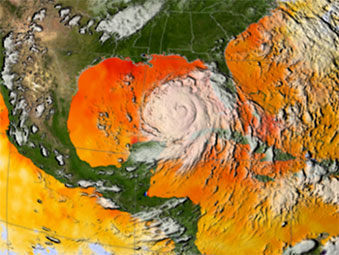Global warming link to hurricanes challenged
Global warming link to hurricanes challenged
mongabay.com
July 31, 2006
Last week a leading meteorologist challenged a proposed link between global warming and hurricane intensity, based on inaccuracies in the historical data used in the studies.
 Warm ocean waters fuel hurricanes, and there was plenty of warm water for Katrina to build up strength once she crossed over Florida and moved into the Gulf of Mexico. This image depicts a 3-day average of actual sea surface temperatures (SSTs) for the Caribbean Sea and the Atlantic Ocean, from August 25-27, 2005. Every area in yellow, orange or red represents 82 degrees Fahrenheit or above. A hurricane needs SSTs at 82 degrees or warmer to strengthen. The data came from the Advanced Microwave Scanning Radiometer (AMSR-E) instrument on NASA’s Aqua satellite. The GOES satellite provided the cloud data for this image. Image Credit: NASA/SVS.
Birthplace of hurricanes heating up say NOAA scientists The region of the tropical Atlantic where many hurricanes originate has warmed by several tenths of a degree Celsius over the 20th century, and new climate model simulations suggest that human activity, such as increasing greenhouse gas emissions into the atmosphere, may contribute significantly to this warming. This new finding is one of several conclusions reported in a study by scientists at the NOAA Geophysical Fluid Dynamics Laboratory in Princeton, N.J., published today in the Journal of Climate. Global Warming Fueled Record 2005 Hurricane Season Conclude Scientists Global warming accounted for around half of the extra hurricane-fueling warmth in the waters of the tropical North Atlantic in 2005, while natural cycles were only a minor factor, according to a new analysis by Kevin Trenberth and Dennis Shea of the National Center for Atmospheric Research (NCAR). The study will appear in the June 27 issue of Geophysical Research Letters, published by the American Geophysical Union. 2006: Expect another big hurricane year says NOAA The 2006 hurricane season in the north Atlantic region is likely to again be very active, although less so than 2005 when a record-setting 15 hurricanes occurred, according to the National Oceanic and Atmospheric Administration (NOAA). |
Chris Landsea, a storm researcher at the National Hurricane Center, and colleagues argued in a paper published in the journal Science that improvements in technology now allow forecasters to produce more accurate estimates of a storm’s power, meaning that more hurricanes are now recognized as Category 4 and 5 storms than prior to the 1980s. They said that the storm databases used by researchers who found links between hurricanes and warmer sea temperatures contain inaccurate information.
“It’s not to say that global warming isn’t causing changes. I don’t dispute the fact that global warming is going on or that it can have an impact on hurricanes,” Landsea told Reuters. “But you’re getting a better analysis of how strong that hurricane is.”
The Science article reports that reanalysis of historic data found about 70 previously unrecognized Category 4 and 5 hurricanes in the eastern hemisphere from 1978 to 1990, a finding that weakens the argument that the number of intense hurricanes is rising with sea temperatures.
“For some of the storms in the north Indian Ocean, if they were to occur today, we would say they are Category 4 or 5 and yet they are listed in the data as Category 3 or weaker,” said Landsea, who noted that a 1970 cyclone that killed 500,000 people in Bangladesh is not even listed as a hurricane.
Last year, two studies published in the journals Nature and Science found a strong correlation between rising tropical sea surface temperatures and an increase in the strength of hurricanes.
The Nature study, published in July 2005 by Kerry Emanuel, an atmospheric scientist at Massachusetts Institute of Technology, found that hurricanes in the north Atlantic and the north Pacific Oceans have grown significantly more powerful and destructive over the past three decades. Emanuel reported that “both the duration of the storms and their maximum wind speeds have increased by about 50 per cent since the mid-1970s”, developments that are mirrored by increases in the average temperatures at the surface of the tropical oceans. At the time of publication, Emanuel warned that global climate change might increase the effect of hurricanes still further in coming years.
In September, following the destruction wrought by Hurricane Katrina, Science published study by researchers at the Georgia Institute of Technology and the National Center for Atmospheric Research (NCAR) indicating that the number of Category 4 and 5 hurricanes worldwide has nearly doubled over the past 35 years, from about 10 Category 4 and 5 hurricanes per year in the 1970s to 18 per year since 1990.
The two studies were later backed by researchers at Georgia Tech and the National Center for Atmospheric Research.
This article is based on a Reuters news article and information from Science and previous mongabay.com news articles.